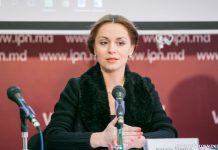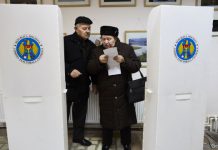Ukrainian authorities hope that formal negotiations on the Transnistrian issue in the "5+2" format, stopped in 2006, will be resumed after the election of a new Parliament of Republic of Moldova. Until then, officials in Kiev encourage Chisinau and Tiraspol to continue with the small steps policy”. However, Ukrainian officials believe that the Moldovan-Ukrainian bilateral dialogue is sluggish because of Chisinau.
Statements to this effect were made by representatives of the Ukrainian MFA at a meeting with representatives of media outlets from both banks of Nistru river while visiting Kiev. Ukrainian officials have expressed regret at the absence of official dialogue, but have found that informal meetings – at the level of politicians, officials, and civil society – are intense and dynamic. The following were mentioned as achievements of the "small steps policy": revival of the Chisinau-Odessa train route running through Transnistria as well as the statement of Prime Minister Vlad Filat on the possibility to restore direct telephone link between the two sides of the Nistru in the near future.
The representative of current opposition in Kiev, Head of the European Integration Committee of Ukrainian Rada, Boris Tarasyuk hopes that after the election of new parliament in Chisinau, the parties will return to the negotiation table. Now it is difficult to predict how things will develop, since Moldova is on the eve of new early parliamentary elections. Republic of Moldovas position on the Transnistrian settlement will depend on who wins this election, I think. As a representative of the democratic forces in Ukraine, I want democratic forces to win in Moldova…” said Boris Tarasyuk. He noted that Ukraine’s position remains that expressed in the so-called "Yushchenko plan" (which he initiated), that provides for a settlement through democratization, respect for several principles: preserving the sovereignty and territorial integrity of Moldova, providing a special status for the Transnistrian region, respect for human rights etc. According to the plan proposed by us, if there had been political will in Chisinau and Tiraspol, the conflict would have been resolved within five years. Unfortunately, such willingness was not there”, said Tarasyuk at a meeting with journalists from Republic of Moldova.
Concerning the joint declaration of Merkel-Medvedev on Transnistrian issue of June 2010, the Ukrainian parliament said that it raises questions. It is not strange in itself that two major powers have agreed to collaborate in the Transnistrian settlement. The problem is that these powers simply dilute the existing "5+2" format, in which they participate as well: Germany, through the EU and Russia directly, as a mediator. However, if the efforts of these two countries contribute to the implementation of agreements reached within the "5+2" format, I have nothing against it”, Tarasyuk said.
When asked about the difficulties faced by people with Ukrainian citizenship in Transnistria, where there is no consulate of Ukraine in the region, Tarasyuk said: We respect the aspirations of Ukrainians from Transnistria to preserve their language, culture, relations with Ukraine and we try to and support. But Ukraine does not recognize Transnistrias independence and respects the territorial integrity of Republic of Moldova throughout its constitutional territory. Therefore, authorities in Kiev will not do anything that would come into conflict with the provisions of international law. Without approval from Chisinau, we will not open consulates in the region”. According to Tarasyuk, Ukrainian citizens who want to vote in elections in Ukraine can do so in legally opened polling stations in Republic of Moldova and regarding documents issues they can get in touch including with the consular mission making regular visits to Transnistria.
Boris Tarasyuk, former Ukrainian Foreign Minister and one of the politicians involved in the Transnistrian settlement process from the very beginning, believes that the Transnistrian problem can not negatively affect Ukrainian prospects for European integration. The official is convinced that Ukraine continues to be a leader among Eastern partnership states in the process of coming closer to the EU. Thus, the neighboring country hopes to sign during the second half of next year, the Association Agreement with the EU.
Regarding the relations between Moldova and Ukraine, Tarasyuk believes that they are not good enough because of Chisinau: I am sorry that Moldova does not fulfill its commitments, including submission into Ukrainian ownership of the land under the road at Palanca. As long as Moldova does not fulfill its promises, it will overshadow the bilateral dialogue”.
Moldovan journalists visit to Kiev took place within the Transnistrian Dialogues” project run by the Foreign Policy Association, with support from embassies of Sweden, Finland and Great Britain.






